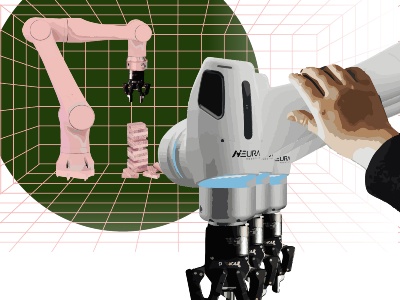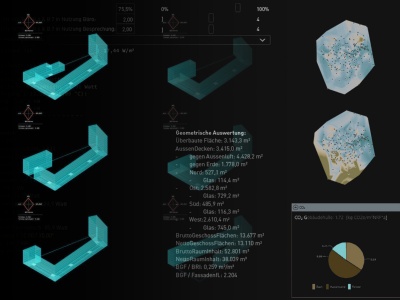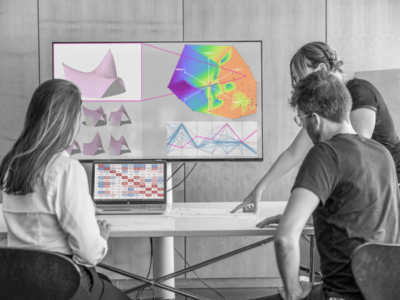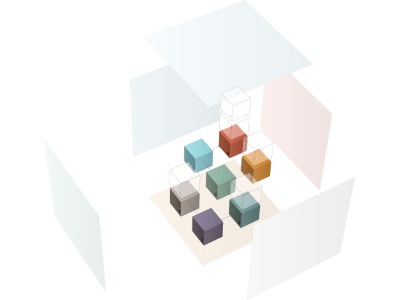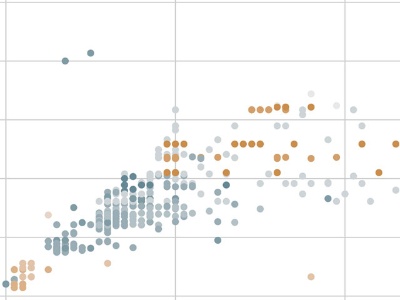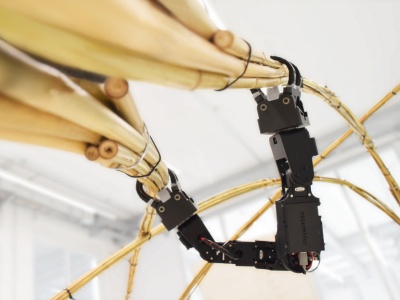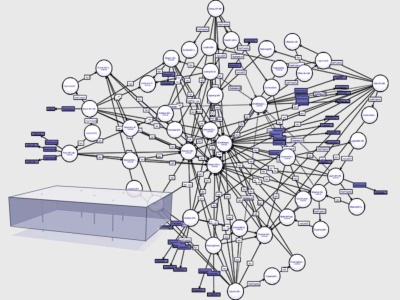Related Research Tools
Selected Publications
2025
- Zorn, M., Claus, L., Frenzel, C., & Wortmann, T. (2025). Optimizing an expensive multi-objective building performance problem: Benchmarking model-based optimization algorithms against metaheuristics with and without surrogates. Energy and Buildings, 336, 115562. https://doi.org/10.1016/j.enbuild.2025.115562
- Elshani, D., Lombardi, A., Hernandez, D., Staab, S., Fisher, A., & Wortmann, T. (2025). AEC Co-design workflow for cross-domain querying and reasoning using Semantic Web Technologies. Automation in Construction, 176, 106226. https://doi.org/10.1016/j.autcon.2025.106226
2024
- Elshani, D., Dervishaj, A., Hernández, D., Gudmundsson, K., Staab, S., & Wortmann, T. (2024). An Ontology for the Reuse and Tracking of Prefabricated Building Components. Proceedings of the the 2nd International Workshop on Knowledge Graphs for Sustainability (KG4S 2024) Colocated with the 21st Extended Semantic Web Conference (ESWC 2024), 3753, 53–64. https://ceur-ws.org/Vol-3753/paper5.pdf
- Skoury, L., Treml, S., Opgenorth, N., Amtsberg, F., Wagner, H. J., Menges, A., & Wortmann, T. (2024). Towards data-informed co-design in digital fabrication. Automation in Construction, 158, 105229. https://doi.org/10.1016/j.autcon.2023.105229
- Kannenberg, F., Gil Pérez, M., Schneider, T., Staab, S., Knippers, J., & Menges, A. (2024). Bayesian Inference for Modelling Uncertainty in Non-Standard Building Systems. In P. Eversmann, C. Gengnagel, J. Lienhard, M. Ramsgaard Thomsen, & J. Wurm (Eds.), Scalable Disruptors. DMS 2024 (Proceedings of the Design Modelling Symposium 2024) (pp. 69–80). Springer Nature Switzerland. https://doi.org/10.1007/978-3-031-68275-9_6
- Abdelaal, M., Galuschka, M., Zorn, M., Kannenberg, F., Menges, A., Wortmann, T., Weiskopf, D., & Kurzhals, K. (2024). Visual analysis of fitness landscapes in architectural design optimization. The Visual Computer, 40, Article 7. https://doi.org/10.1007/s00371-024-03491-3
- Ron, G., Menges, A., & Wortmann, T. (2024). Critical Collaboration: Reflecting on Power and Agency in Human-Robot-Collaboration in Architecture and Construction, for a Diverse and Democratic Practice. In P. Eversmann, C. Gengnagel, J. Lienhard, M. Ramsgaard Thomsen, & J. Wurm (eds.), DESIGN MODELLING SYMPOSIUM KASSEL 2024 – SCALABLE DISRUPTORS (re)new(able) materials and circular design and construction processes (No. 1; Vol. 1, pp. 191–204). Springer. https://doi.org/10.1007/978-3-031-68275-9_16
- Gomaa, H., Chau, W. M., Karazi, Y., Biala, E., Akbar, Z., Wortmann, T., & Ostermann, M. (2024). Influence of Geometry on Growth and Strength of 3D-Printed Mycelium Composites: A Data-Driven Study. In P. Eversmann, C. Gengnagel, J. Lienhard, M. Ramsgaard Thomsen, & J. Wurm (Eds.), Scalable Disruptors (pp. 331–345). Springer Nature Switzerland.
- Zhang, R., Xu, X., Liu, K., Kong, L., Wang, W., & Wortmann, T. (2024). Airflow modelling for building design: A designers’ review. Renewable and Sustainable Energy Reviews, 197, 114380. https://doi.org/10.1016/j.rser.2024.114380
- Sardari, S., Sevim, S., Zhang, P., Ron, G., Leder, S., Menges, A., & Wortmann, T. (2024). Deep Agency - Towards human guided robotic training for assembly tasks in timber construction. In O. Kontovourkis, M. C. Phocas, & G. Wurzer (Eds.), Proceedings of the 42nd Conference on Education and Research in Computer Aided Architectural Design in Europe. Data-Driven Intelligence. (Vol. 1, pp. 193–202). eCAADe, University of Cyprus, Department of Architecture. https://papers.cumincad.org/data/works/att/ecaade2024_420.pdf
- Bauscher, E., Dai, A., Elshani, D., & Wortmann, T. (2024). Learning and Generating Spatial Concepts of Modernist Architecture via Graph Machine Learning. ACCELERATED DESIGN: Proceedings of the 29th International Conference on Computer-Aided Architectural Design Research in Asia (CAADRIA), Volume1, 159–168.
- Skoury, L., & Wortmann, T. (2024). Prediction Models for Co-Design in Industry 4.0. In P. Eversmann, C. Gengnagel, J. Lienhard, M. Ramsgaard Thomsen, & J. Wurm (Eds.), Scalable Disruptors. DMS 2024 (Proceedings of the Design Modelling Symposium 2024) (pp. 507–519). Springer Nature Switzerland. https://doi.org/10.1007/978-3-031-68275-9_41
- Nakhaee, A., Elshani, D., & Wortmann, T. (2024). A Vision for Automated Building Code Compliance Checking by Unifying Hybrid Knowledge Graphs and Large Language Models. Design Modelling Symposium Berlin, 445–457.
2023
- Sherkat, S., Garmaroodi, A. A., Wortmann, A., & Wortmann, T. (2023). Residential complex design as a Constraint Satisfaction Problem. Automation in Construction, 154, 104995. https://doi.org/10.1016/j.autcon.2023.104995
- Amtsberg, F., Yang, X., Skoury, L., Ron, G., Kaiser, B., Sousa Calepso, A., Sedlmair, M., Verl, A., Wortmann, T., & Menges, A. (2023). Multi-Akteur-Fabrikation im Bauwesen. Bautechnik, 100, Article 10. https://doi.org/10.1002/bate.202300070
- Elshani, D., Hernandez, D., Lombardi, A., Siriwardena, L., Schwinn, T., Fisher, A., Staab, S., Menges, A., & Wortmann, T. (2023). Building Information Validation and Reasoning Using Semantic Web Technologies. In M. Turrin, C. Andriotis, & A. Rafiee (Eds.), Computer-Aided Architectural Design. INTERCONNECTIONS: Co-computing Beyond Boundaries (pp. 470–484). Springer Nature Switzerland.
- Zorn, M. B. (2023). A novel software framework for architectural design space exploration. https://doi.org/10.13154/294-10106
- Sherkat, S., Skoury, L., Wortmann, A., & Wortmann, T. (2023). Artificial Intelligence Automated Task Planning for Fabrication. In K. Dörfler, J. Knippers, A. Menges, S. Parascho, H. Pottmann, & T. Wortmann (Eds.), Advances in Architectural Geometry 2023 (pp. 249–260). De Gruyter. https://doi.org/doi:10.1515/9783111162683-019
2022
- Davidová, M., Fischer, L. K., & Teye, M. (2022). POL– AI: Leveraging Urban EcoSystem. In B. Sweeting (Ed.), Relating Systems Thinking and Design (RSD11) 2022 Symposium (pp. 1–11). Systemic Design Association.
- Akbar, Z., Wood, D., Kiesewetter, L., Menges, A., & Wortmann, T. (2022). A Data-Driven Workflow for Modelling Self-Shaping Wood Bilayer, Utilizing Natural Material Variations with Machine Vision and Machine Learning. In J. van Ameijde, N. Gardner, K. H. Hyun, L. Dan, & U. Sheth (eds.), CAADRIA proceedings: Vol. Volume 1 (pp. 393–402). CAADRIA. https://doi.org/10.52842/conf.caadria.2022.1.393
- Elshani, D., Wortmann, T., & Staab, S. (2022, May). Towards Better Co-Design with Disciplinary Ontologies: Review and Evaluation of Data Interoperability in the AEC Industry. In Proceedings of LDAC2022 - 10th Linked Data in Architecture and Construction Workshop.
- Elshani, D., Lombardi, A., Fisher, A., Staab, S., Hernández, D., & Wortmann, T. (2022, May). Knowledge Graphs for Multidisciplinary Co-Design: Introducing RDF to BHoM. In Proceedings of LDAC2022 - 10th Linked Data in Architecture and Construction Workshop.
- Skoury, L., Amtsberg, F., Yang, X., Wagner, H. J., Menges, A., & Wortmann, T. (2022). A Framework for Managing Data in Multi-actor Fabrication Processes. In C. Gengnagel, O. Baverel, G. Betti, M. Popescu, M. R. Thomsen, & J. Wurm (Eds.), Towards Radical Regeneration (pp. 601–615). Springer International Publishing. https://doi.org/10.1007/978-3-031-13249-0_47
- Zorn, M., Catunda, N., Claus, L., Kobylinska, N., Frey, M., & Wortmann, T. (2022). Replacing energy simulations with surrogate models for design space exploration. Bauphysik, 44, Article 6. https://doi.org/10.1002/bapi.202200034
- Sherkat, Shermin., Wortmann, Andreas., & Wortmann, Thomas. (2022). Potentials of Symbolic AI Planning for Construction. Forumbauinformatik. https://www.researchgate.net/publication/363481115_Potentials_of_Symbolic_AI_Planning_for_Construction
- Zorn, M., Catunda, N., Claus, L., Kobylinska, N., Frey, M., & Wortmann, T. (2022, September). Replacing Time-Consuming Building Performance Simulations with Real-Time Surrogate Models and their Application in Early-Stage Design Space Exploration. Proceedings of BauSim Conference 2022. https://publications.ibpsa.org/conference/?id=bausim2022
- Wortmann, T., Cichocka, J., & Waibel, C. (2022). Simulation-based Optimization in Architecture and Building Engineering—Results from an International User Survey in Practice and Research. Energy and Buildings, Article 259. https://doi.org/10.1016/j.enbuild.2022.111863
- Elshani, D., Lombardi, A., Fisher, A., Staab, S., Hernández, D., & Wortmann, T. (2022, September). Inferential Reasoning in Co-Design Using Semantic Web Standards alongside BHoM. Proceedings of 33. Forum Bauinformatik. https://doi.org/10.14459/2022md1686600
2021
- Natanian, J., & Wortmann, T. (2021). Simplified evaluation metrics for generative energy-driven urban design: A morphological study of residential blocks in Tel Aviv. Energy and Buildings, 240, 110916. https://linkinghub.elsevier.com/retrieve/pii/S0378778821002000
- Wortmann, T., & Natanian, J. (2021). Optimizing solar access and density in Tel Aviv: Benchmarking multi-objective optimization algorithms. Journal of Physics: Conference Series, 2042, Article 1. https://doi.org/10.1088/1742-6596/2042/1/012066
- Natanian, J., Luca, F. D., Wortmann, T., & Capeluto, G. (2021). The Solar Block Generator: an additive parametric method for solar driven urban block design. Journal of Physics: Conference Series, 2042, Article 1. https://doi.org/10.1088/1742-6596/2042/1/012049
- Petrov, M., & Wortmann, T. (2021, April). Latent fitness landscapes - Exploring performance within the latent space of post-optimization results. Proceedings of the Symposium on Simulation for Architecture & Urban Design.
- Waibel, C., Zhang, R., & Wortmann, T. (2021, April). Physics Meets Machine Learning: Coupling FFD with Regression Models for Wind Pressure Prediction on High-Rise Facades. Proceedings of the Symposium on Simulation for Architecture & Urban Design.
Contact Information

Thomas Wortmann
Tenure-Track prof. Dr.Tenure-Track Professor





